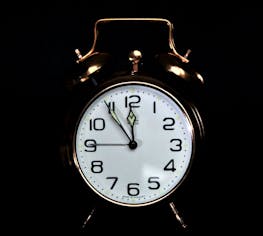Billy Crystal famously said, 'Women need a reason to have sex. Men just need a place.'
Why Is Sex Fun? is a lighthearted exploration of human sexuality, that looks at sex life, monogamy, marriage, power, and the body. Biologist Jared Diamond shows how there's more to sex than recreation and procreation.
Jared Diamond's popular science book is an interdisciplinary approach to sex, that looks at evolution and the rise of the human species. By looking at sex as a set of behaviors unique to humans, we're shown how genetics, and our choices, have led to how we approach sex and sexuality.
We'll briefly look at the book's key ideas, and gain insight into why sex is fun. Furthermore, we'll learn how our sexual habits make evolutionary sense and increase our chances of survival.
Behind Closed Doors
In 1990, Salt-N-Peppa released the hit song Let's Talk About Sex. They threw down the gauntlet with their song saying, 'It keeps coming up anyhow. Don't be coy, avoid, or make void the topic. Cuz that ain't gonna stop it.'
If we go back through history, we can observe many cultures and societies where sex was taboo and seldom spoken about.
In Victorian England for example, sex was seen as something that should be kept behind closed doors – never discussed, and for procreation purposes only. Women who engaged in more rigorous sexual pursuits were advised that they were at risk of a stroke, and no delicate woman of good status would survive such an activity. Furthermore, blindness and insanity were other so-called risks to consider. The Victorian mentality towards sex and sexuality was undoubtedly prudish; however, the idea that they covered all table legs to ward off impure thoughts, is utter nonsense. That being said, they didn't put much life into the concept of a sex life.
If we compare humans with other mammals, we're highly unique. Whereas other mammals have sex or mate during specific periods (when fertility is high), humans have sex whenever it pleases us. Most often than not, a human's sexual desire isn't dependent on the female's fertility.
Mammals tend to function in groups with a dominant male, who passes his genes around the group. If another male wants to have sex with any female, he has to fight for this right. Some mammals live relatively solitary lives, and come together for mating purposes. Nonetheless, the idea of marriage or having a long-term relationship is utterly alien to most species. Although there are animals such as beavers, gibbons, and penguins that are monogamous, most mammals have multiple sexual partners.
However, as we know, marriage isn't just about monogamy and committing oneself to a partner for "as long as you both shall live." For many humans, marriage is also about creating a family, and raising children together. While many women still take on the lion's share of parenting, in human relationships, both parents still typically raise their children together. If we look at most other mammals, it's solely the female's responsibility to take care of offspring.
Then there's the fact that humans don't mate in the open like other mammals. We're mostly very private about our sexual activity, and we seldom engage in sexual intercourse in front of other people. In most cases, sex is an intimate and highly private activity that takes place behind closed doors. Again, this may make evolutionary sense because animals having sex in the open are vulnerable to predators.
Humans aren't just intensely private about our sexual antics; we also hide women's ovulation and menstruation. Sanitary products are seen as embarrassing, and a woman never advertises her fertility. Female baboons on the other hand, present a large red sign to their male counterparts. Male baboons know precisely when females are ovulating because the area around the vagina becomes swollen and turns red.
Nature and Nurture
Although we humans are territorial, we don't occupy a specific territory that we protect exclusively. Instead, we're social animals who rely on each other culturally and economically to forge a stable society. Creating such stability often comes down to how we form relationships.
In the animal kingdom, the dominant male tends to mate with numerous partners and spreads his genes about. The idea is that the offspring of a dominant male are more likely to survive than those that come from a less worthy specimen. However, in humans, this is different because we take nurturing into account. While we may share genes with both parents, the story doesn't end there.
Women generally spend more time with their offspring and go through pregnancy and breastfeeding, which secures the bond between mother and child. Males actually have the physiological makeup for lactation, but they simply haven't evolved to breastfeed as women do. Diamond proposes that this may be something that evolution may or may not necessitate in the future.
Women also can't spread their genes around as often or as abundantly as men can. In theory, men can ostensibly impregnate as many women as will oblige, allowing men to spread their genes a lot more than women. Women need at least a year between pregnancies before they can even think about creating another human. However, nowadays, men tend to commit to a partner if there's a baby. This is so that they can help with some of the child-rearing responsibilities. In fact, having monogamous relationships helps to protect our young. There's no doubt that the roles of mothers and fathers differ across contexts; however, in most modern societies, fathers play a role in child-rearing. Nonetheless, women are tied more securely to their offspring because of their biology and physiology.
There's also the matter of being sure of paternity and maternity. Women can be 100% confident that they're the mother of their child, whereas men don't have the same level of certainty. Before paternity or DNA testing, there could always be scrutiny about whether a man was the father of their child.
One of the most significant differences between humans and our closest relatives, the apes, is that female humans go through menopause. While menopause may make very little evolutionary sense, our author explains why women should be infertile for such a large portion of their lives. Diamond suggests that it comes down to survival. Raising children is difficult. Therefore focussing on children who are already born, rather than bringing more into the world, particularly when health and fitness are more precarious, seems prudent. Furthermore, older women in society are often caregivers for grandchildren and hold an important role from a kin work perspective. Older women in traditional societies also have a crucial role in terms of teaching younger women about survival.
If we look at apes, most of them don't live beyond the age of 60. On the other hand, humans have a lifespan that's increasing, and our bodies are in better shape than that of the average ape. Our author argues that menopause can explain some of this. By having a limited fertility timespan, we're able to stay healthier and more robust. Childbirth is traumatic for the body, and we need time to repair ourselves after such an event. Mice have a very short lifespan because they have about five babies every couple of months. Humans tend to focus our attention on maintenance and repairs instead of intense reproduction, and as a result, we have a better chance of long-term survival.
The Cost of Sex
Many people think of sex as purely recreational. When we're younger and not thinking about procreation, but instead just going along with our libidos, we often downplay the ramifications of having sex.
Sex has risks, and it can be expensive. Not only are there a range of sexually transmitted diseases to consider, but the cost of bringing a child into the world is high. So why do we have recreational sex and continue to be gung ho about the consequences? Our author posits two theories for why humans have sex as a recreational activity.
The "many fathers" theory asserts that because we don't know when women are ovulating, this creates confusion about paternity. Women can ostensibly have sex with multiple partners, which can create ambiguity over who the father is. According to our author, this may have been an evolutionary decoy to decrease the chance of infanticide. So we have evolved to be able to protect our young.
Then there's the theory called "daddy-at-home." The premise of this theory is that by being able to have sex whenever we like, women entice men to cohabit, in order to enjoy the perks of being available to round-the-clock sex. Diamond argues that concealed ovulation evolved out of women's need to protect their children from infanticide. Once ovulation became concealed, monogamy arose out of the need to have a dependable partner who would provide safety and security.
In short, monogamy is a lot safer than having multiple partners.
Bringing Home The Bacon
What do men contribute to childcare?
If we look at the majority of mammals, the answer is a short one. Very little.
However, the human father is altogether different, and he often remains with his family after sex. Anthropologists argue that how human males have evolved to focus more heavily on family life and responsibilities is crucial. In early traditional societies, the role of the man was to hunt.
The role of the hunter is where Diamond found some fascinating revelations. Our author looked towards tribes in New Guinea and Paraguay. What he found was that hunting isn't just about providing meat and showing that you're a capable protector; there's more to the story. When it comes to bringing home the bacon, hunters often fall short. Interestingly, women in hunter-gatherer societies typically burn more calories on average than men.
What's more, they're more consistent when it comes to providing food. So why don't men spend their time gathering food? What does this mean?
Well, Diamond suggests that it comes down to sex. If we look at many tribal women, they gravitate towards having sex with talented hunters. So if you're a good hunter, you're likely to be chosen as a prospective partner. Diamond asserts that in such societies, there are two types of men, "providers" and "show-offs." Sadly, most women opt for show-offs because they have a higher social status, despite their inability to contribute much.
What Are We Being Sold?
We're told that sex sells. But what do we value when it comes to sexual characteristics?
Many animals have developed signals that advertise our dominant traits and biological attributes. For example, birds use song and elaborate plumage to show off to potential mates.
Fisher's Runaway Selection Model is a theory that suggests females are attracted to any characteristics that aid with survival. Hence if a man is muscular, or good at running, or incredibly strong, these traits mean that he will be better at providing and protecting. Zahavi's Handicap Theory offers an alternative argument. If we look at a peacock's tail, this adds no value to survival, protection, or anything. Sure, it looks pretty, but that's about it.
You may have heard the term "peacocking?" In the contemporary dating scene, men highlight their attributes by drawing a lot of attention to them. So they may accentuate their legs by wearing tight shorts, or even wearing very bright colors to stand out from other men. However, Zahavi says that this might actually handicap men. Men who spend a lot of time and money on their appearance may not be viable to most women. If a man is into conspicuous consumption, he's less likely to want to provide for his family. And, if he is too into his ego, he may not be a loving and attentive mate.
In short, a man's good looks and grooming may be a handicap. When we look at the idea of sex appeal, it's a lot more than just good looks and a snappy hairdo.
In Conclusion
Why Is Sex Fun? offers some fascinating theories on human sex and sexuality. It's a lighthearted and engaging read that needs to be enjoyed as a collection of ideas, rather than a definitive answer.
Sex is one of the most critical aspects of human and animal behavior, and it's something that we should be talking about and theorizing a lot more. Without sex, there's no survival.
By looking at the evolution of sex and sexuality, we can gain tremendous insight into how we have got to where we are.
While Billy Crystal may have distinguished between reason and place, and male and female, human sex and sexuality is a journey through evolution. And we're still evolving, so we should always talk about sex.




